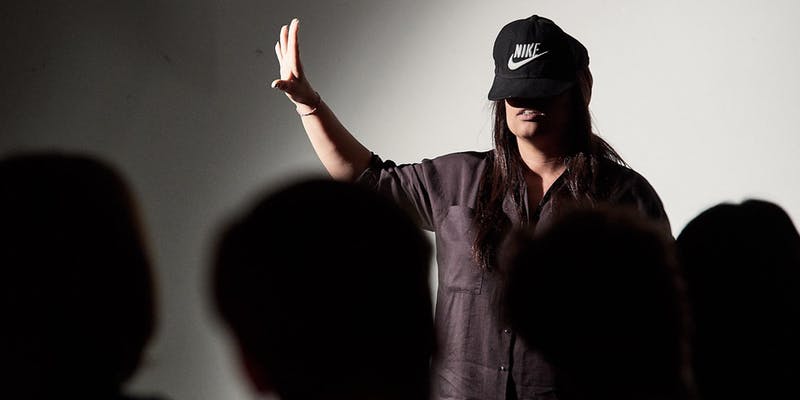Lara Wuester, BA English and Humanities student on the Erasmus program from Munich, reviews the panel discussion “But Are You Doing Anything?” shown as part of Arts Week 2019.
Gestation is “the development of ideas, thoughts and plans.” (Cambridge Dictionary, 2019) For some, gestation is procrastination, distraction, displacement, being bored, lethargic. In terms of the 21st century, it is being unproductive, doing nothing at all. Or at least nothing visible to someone from the outside. Jane Woddis, Rachel Garfield and Lina Džuverović talked about their personal experiences with gestation and the production of art. In the following, a few lessons learned will be summed up.
Gestation is part of the production process.
Jane, Arts Manager and Associate Fellow at the Centre for Cultural and Media Policy Studies at the University of Warwick, presented the interconnection of gestation and production. As a fundraiser, she has seen and analyzed many different approaches to the creative process, from the detailed reflection to the other end of the scale: bold experimenting. Gestation, even more so than production, is a process, that differs from person to person. It can be solitary, it can be collaborative, it can be the writing of a thousand drafts or the perfection of a single one, it can be weeks of thinking, or actually getting things done in a day. The pressure of production does not necessarily have to influence the process of conception and gestation. In our fast-paced world, time to think, to talk, to develop is not valued, the outcome counts. But especially in the creative industries, production needs gestation, gets inspired by it.
Creativity needs boredom.
People today who still have time for boredom and yet are not bored are certainly just as boring as those who never get around being bored. For their self has vanished – the self whose presence particularly in this bustling world, would necessarily compel them to tarry for a while without a goal, neither here nor there. (Krakauer, 1993, p.104)
Krakauer argues that in fact to let ideas thrive and develop one needs to let go of headphones, radio, television, thoughts of the stars, staring at pictures in one’s mind that are superimposed by surroundings and people. We need to just close the curtains and spend time on our own to enjoy legitimate boredom, aimlessness, and restlessness without a goal, which resolves in undirected passion and ideas. In this context, Rachel, artist and Head of Department of Art at the University of Reading, highlighted the importance of the context and surroundings of artists on their practice and work. She mentioned, how much a city can be both enabling and tyrannizing, how one can be controlled by thoughts of funding and audience. How taking steps back, taking time to incubate helps the creative process and the product. That in fact, creativity sometimes needs nothing at all, no inspiration, no input, just closed eyes and boredom.
Academia complements the arts.
Academia and arts both are to some point influenced by funding and research, still, academia can offer a healthy retreat from the arts and offer exactly the distance and objectivity required to explore and reflect upon one’s own work, according to Rachel Garfield. Also, the university offers a space of communication, conversation and meeting of ideas and can support the artist community already existing. But can an artist who is not producing constantly still be considered to be one? Does taking a break, for example working in academia, automatically take away the right to call yourself an artist? Can it not be seen as a legitimate break or gestation process?
Art does not have to be dependent on money.
Lina also mentioned in her talk Stilinović’s essay “In Praise of Laziness” which compares Eastern to Western artists. The big difference, according to Stilinović, is that artists in the West always produced something, were involved in production, promotion, museums, competition and money. Artists in the East were lazy and poor, as they knew producing art was pure vanity. Answering the question of the monetization of the arts, Rachel said that it should not be these contexts that prescribe what you are doing, but far more importantly, your relationship to it shows what really matters to you as an artist.
In conclusion, being unproductive may not be paid, but it should be valued as an important part of production and creativity. Although there is a constant professionalization, monetization and academisation of the arts, it is the individual approach and process of making art and the relationship to external processes, hierarchies and structures that counts. And doing absolutely nothing can sometimes be crucial for doing something.
Thank you, Simone Wesner, for chairing this interesting event, that triggered many more thoughts and questions.
References
Cambridge Dictionary, Cambridge university Press, 2019, < https://dictionary.cambridge.org/dictionary/english/> [accessed:7.06.2019].
Krakauer, Siegfried, ‘Boredom’, Facing Value: Radical Perspectives from the Arts, ed. by. Lauwaert, Maaike and van Westreen, Francien (Den Haag, 2017: Valiz/Stroom Den Haag), pp.104-119.
Stilinović, Mladen, ‘In Praise of Laziness’, Atlas of Transformation, 1993, < http://monumenttotransformation.org/atlas-of-transformation/html/l/laziness/in-praise-of-laziness-mladen-stilinovic.html> [accessed: 08.06.2019].

